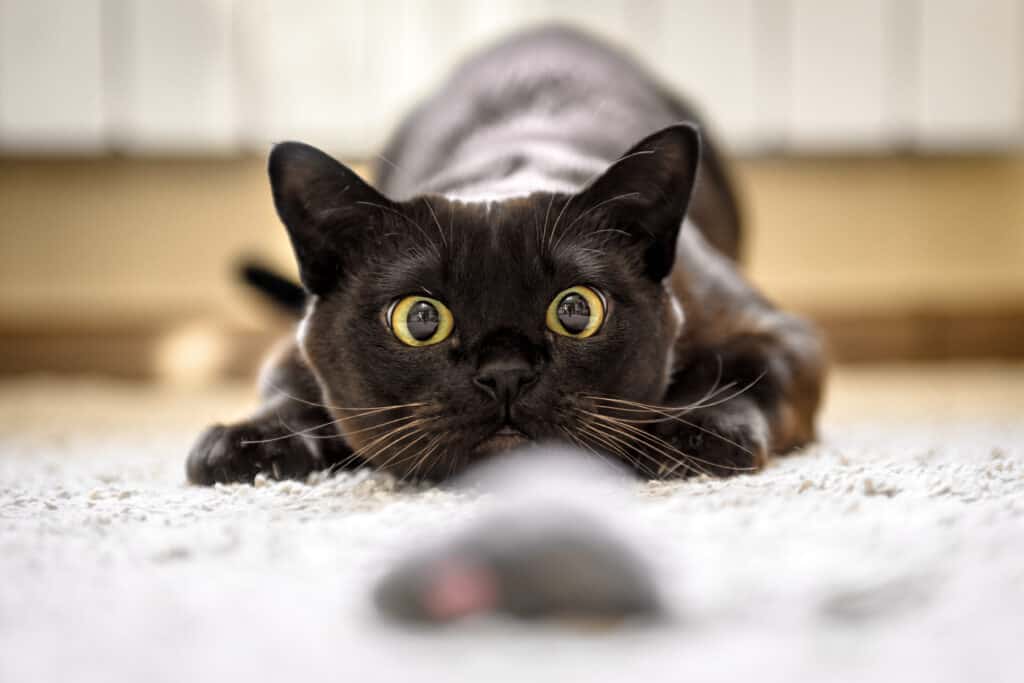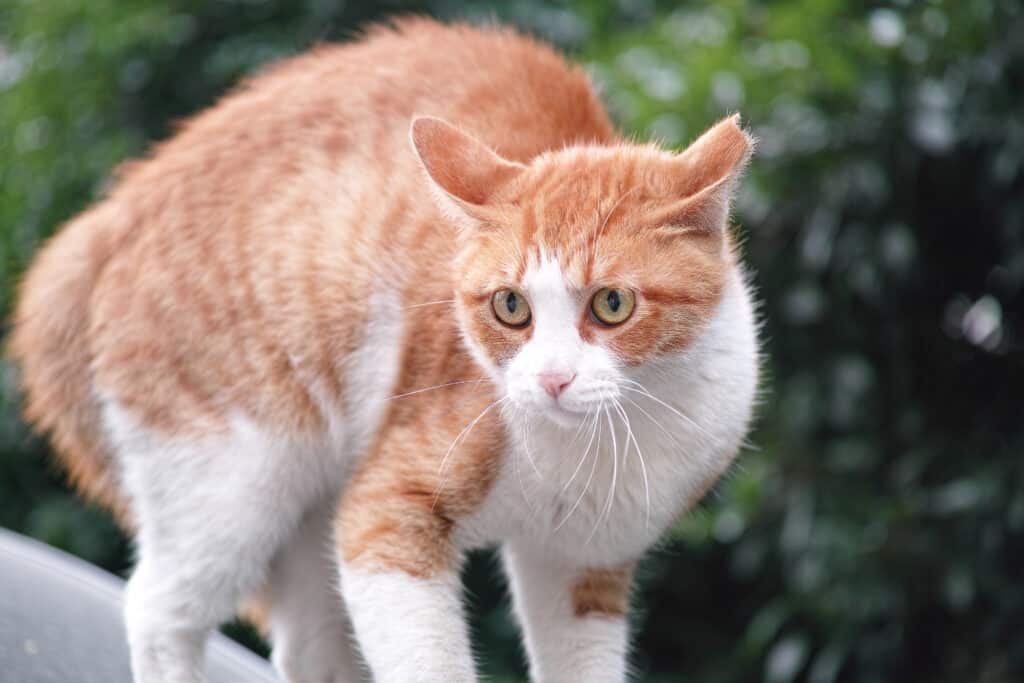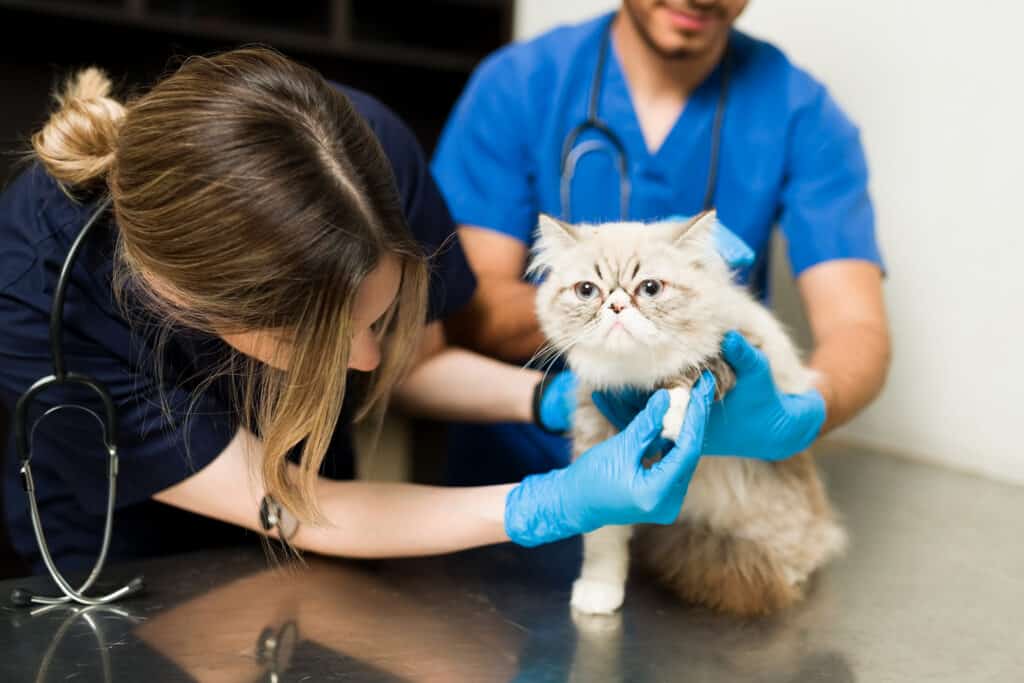Cats are such adorable creatures. They’re furry and sometimes grace us with cuddles. But then there’s the biting. It can be frustrating when your cat sinks their teeth into you for no apparent reason. It’s almost like “Jaws” one minute; you’re enjoying the quiet the next, and you’re bleeding because something sunk its teeth into you.
A biting cat can be a dangerous game of protecting your hand and toes. Cats bite for different reasons than dogs, and there are various ways to discourage biting in cats. They may bite because they feel frightened, assert themselves, or to get you to notice them.
Here you will find these reasons looked into in detail. Once you find out why your cat may bite, you can learn how to prevent it better and get back to enjoying simple cuddles with your cat that don’t require Neosporin and a bandaid.
Feels Threatened or Scared
Cats can be misunderstood creatures. One of the common reasons cats bite is feeling threatened or scared. If a cat feels in danger, it might lash out and try to protect itself. This can happen if you try to pick up a cat that doesn’t want to be held or approach a cat too quickly. It’s important to give cats time to adjust to new people and situations and always let them approach you on their terms.
Sometimes if a guest brings over their pet, it can cause them to be on edge too. If a cat feels threatened, it’s also essential to give it a way to escape. Otherwise, the cat might bite out of fear. Cats are complex creatures, and respecting their needs and boundaries is essential. Doing so can help prevent bites and build a strong bond with your feline friend.

Sometimes cats may bite because they feel scared or threatened.
©TShaKopy/Shutterstock.com
Trying to Protect Something
Another reason why cats might bite is that they’re trying to protect something. This is most commonly seen with food or territory. They can also be protective of their kittens. If a cat feels like their property or offspring might be taken, it might bite to defend it.
Similarly, if a cat feels like its habitat is being invaded, it might also lash out with a bite. In both cases, respecting a cat’s boundaries and giving them space is essential. If a cat feels protective, it’s best to let it be until it calms down. Cats are similar to humans in these instances. How would you feel if someone just came into your bedroom, plopping on the bed while you were eating cheese sticks? Your first thought, as feral as it sounds, is, “I’m not sharing!”

Sometimes cats bite to protect things important to them.
©Esin Deniz/Shutterstock.com
High Prey Drive
Some cats have a prey drive that is a bit higher than others. This means they’re more likely to see small moving objects as something to chase and capture. If your cat has a more active prey drive, it might see your hand as something to play with or catch. While this isn’t necessarily bad, it can be dangerous if your cat decides to bite.
If you have a cat with a high prey drive, it’s essential to give it plenty of toys to play with and always supervise it when it’s around small children or other animals. Cats with a high prey drive often love to play with toys that move, such as toy mice or balls. They may also enjoy chasing beams of light from a laser pointer. Providing your cat opportunities to play will help keep its hunting instincts honed and reduce the likelihood of biting someone out of boredom or frustration.

If your cat is treating your hand like a mouse, it might be a good idea to get him a toy to chew on instead.
©Viacheslav Lopatin/Shutterstock.com
Stressed or Anxious
Some cats bite because they’re stressed or anxious. Cats can get stressed from changes in their environment, like moving to a new home or adding a new pet. They can also get stressed from changes in their routine, like a new baby in the house. A cat might lash out with a bite if feeling stressed or anxious.
Humans have this habit as well. You can be stressed and snap at people. Heck, you might want to bite people too, but you don’t because it’s frowned upon. It’s essential to identify what’s causing your cat stress and help them adjust to change gradually. You can also help reduce your cat’s stress by providing them with plenty of hiding places and vertical space.

A cat that is anxious or stressed may bite your hand.
©atiger/Shutterstock.com
The Cat Is in Pain
Cats are independent and can be stand-offish, but that doesn’t mean they don’t feel pain like any other animal. When cats are hurt or in pain, one of the ways they may express this is by biting. So, if your cat unexpectedly bites you, it’s essential to understand why they might be doing it.
It could be that they’re injured and need veterinary care, or they may be experiencing some chronic pain. If your cat is biting more frequently or severely than usual, it’s best to take them to a vet to check and rule out health issues. In the meantime, try to give them lots of love and get checked attention, as this can help cats feel more comfortable and secure.

A cat may bite because he’s in pain. If you think this describes you cat, take him to the vet to be examined.
©Beach Creatives/Shutterstock.com
How to Address a Cat that is Biting
If your cat is biting you, you can do a few things to stop the behavior. First, ensure that your cat has many toys to play with for entertainment. Biting can also signify boredom, so providing your cat with lots of different toys will help keep them entertained. Second, if you’re playing with your cat and they start to bite, stop playing.
If you continue to let them bite or play rough, it will only encourage them to keep biting. Finally, it’s best to ask a vet for advice if the biting is severe. They may be able to recommend a behavior modification plan or suggest other solutions. It can also help ensure that your cat’s not in pain to get an expert opinion on the situation. By following these tips, you can hopefully stop your cat from biting.
Conclusion
Now that you know why your kitty is biting your toes, it’s time to prevent them from doing so. Start by figuring out why or what is causing them discomfort or making them feel threatened. Once you understand their motivations, you can start taking measures to keep them from biting.
You and your cat can get back on the right track, and both have the opportunity to play and relax in peace. Following these simple tips can help keep your feet and your cat safe and happy! Now go stop the next kitty cat attack!
You may also like:
- Why Do Cats Hiss?
- Why Do Cats Chirp?
- Why Do Cats Knead?
- Why Do Cats Hate Water?
- Why Do Cats Lick Each Other?
The photo featured at the top of this post is © Oleg Troino/Shutterstock.com
FAQs (Frequently Asked Questions)
What is the best cat toys for a cat that bites?
The best cat toys will require the cat to chase or catch it. Laser pointers and mouse toys are good options, as they allow your cat to stalk and chase without coming into contact with you. You can also try dangly toys that are easy to swat, such as feathers on a string.
How do I treat a cat bite?
Cat bites can be severe, as they are prone to infection. If a cat bites you, washing the wound immediately with soap and water is crucial. You should also apply a sterile bandage and change it daily. Watch for any signs of infection, such as redness, swelling, or drainage. You may need to see a doctor for treatment if you develop an infection. In the meantime, wash the wound and change the bandage regularly. With proper care, most cat bites will heal without complications.
Thank you for reading! Have some feedback for us? Contact the AZ Animals editorial team.






